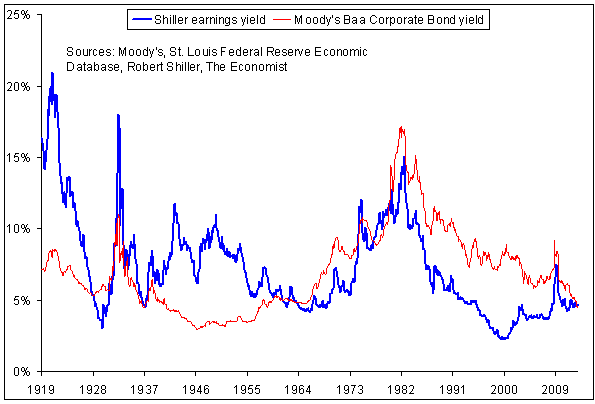Stocks v Yield Bonds Which is Better
Post on: 2 Июль, 2015 No Comment

Stocks vs. High Yield Bonds: Which is Better?
High yield bonds or junk bonds present interesting possibilities for investors. I would propose that right now, while the economy is settling and the actual length of time the recovery will takes is uncertain, high yield bonds could be a very attractive investment.
Video Analysis: High Yield Bonds
Bonds are debt. A company with capital needs will issue bonds that are then purchased by investors. The bonds pay interest to the buyers (or lenders) that will vary based on the quality of the issuer (or borrower.)
Generally speaking corporate bonds fall into three categories.
The first category of bonds are investment grade and are usually A-rated by credit rating agencies like Standard and Poors or Moodys. Investment grade bonds commonly pay 3-5% more than the yield available on the 10 year Treasury note.
High yield bonds are rated below investment grade as B- grade or worse. A high yield bond is considered to carry a higher risk of default or non-payment and therefore the interest rate must be much higher than an investment grade bond. It is common for junk bonds to pay 7-10% more than the yield available on the 10 year Treasury note.
Bonds that are rated below junk (C D) are considered distressed and highly speculative. Usually individual investors steer clear of these kinds of investments. A distressed bond will pay 10% or more than the yield available on the 10 year Treasury note.
While high yield bonds are considered high risk the larger return potential makes a diversified pool of them attractive as a component of a diversified portfolio. While it may be possible to buy these bonds through your broker you may be surprised at how much it costs to do so. For smaller investors, buying individual bonds probably doesnt make sense. Fortunately there are great alternatives.
In the video we will talk about how to buy a high yield bond portfolio through ETFs or funds. This way you can trade them like a stock, pay much lower costs and start with a diversified pool of bonds right from your first purchase.
Bonds are interesting right now because growth is so uncertain. Growth is required for a stock to increase in value whereas a company can make interest payments without growing. If you are pessimistic about the economic recovery and think it will take a while for companies to start growing again, high yield debt may be a good alternative.
Keep in mind that bonds carry specific risks. Like stocks, a bond may lose value when the markets drop. They are sensitive to rising interest rates and accelerating inflation. However, over the last 10 years while the major stock indexes have returned nothing, several high yield bond funds and ETFs have been returning 3-5% per year on average. For a prepared investor these funds may present an ideal addition to a diversified portfolio.














